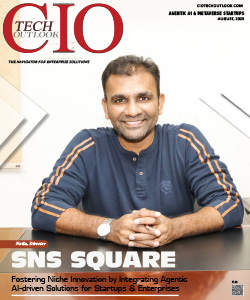India Takes First Steps Towards Democratizing AI
CIOReviewIndia Team | Thursday, 15 October 2020, 09:49 IST
 As the Indian government is pushing for making India a major player in the artificial intelligence (AI) development, Indian organizations are stepping towards democratization of AI, as the chipmaker Nvidia announced that the Centre for Development of Advanced Computing (C-DAC) will be commissioning the company for developing the country’s fastest AI supercomputer, which will be known as PARAM Siddhi.
As the Indian government is pushing for making India a major player in the artificial intelligence (AI) development, Indian organizations are stepping towards democratization of AI, as the chipmaker Nvidia announced that the Centre for Development of Advanced Computing (C-DAC) will be commissioning the company for developing the country’s fastest AI supercomputer, which will be known as PARAM Siddhi.
The supercomputer delivers 6.5 petaflops of power, faster than Pratyush, the current fastest supercomputer in India. As per Hemant Darbari, Director General, C-DAC, it is the first of the large scale high performance computing-AI infrastructure in India. The computer will be providing a platform for academia, scientific community, researchers, industry, startups, and MSMEs, and innovation in science and engineering.
PARAM Siddhi is established under the National Supercomputing Mission and it is expected to help in the development of AI solutions for healthcare, education, energy, cybersecurity, space and others. Darbari said, “It will catalyse partnerships with the Academia, Industry, MSMEs and Startups.”
In addition to C-DAC’s initiatives, Mumbai-based health startup Qure AI implements AI powered chest-XRay screening tool called qXR for analyzing a patient’s lungs, and determining whether needs test. It has helped in optimization of testing kits, which have been a scarce resource during the pandemic. In the states of Maharashtra, Uttar Pradesh, Meghalaya, Assam, Bihar, Jharkhand and Madhya Pradesh, the technology is being implemented.
During the launch of this year’s Responsible AI for Social Empowerment (RAISE) 2020 summit, Reliance Jio Chairman Mukesh Ambani said that India generates enormous amounts of data which makes it important for AI research.
India’s social media company, Sharechat in recent time conducted AI research granting algorithms for producing Hindi shayari. Sharechat released this research publicly for serving as reference to anyone that wants to pursue natural language generation tasks in Indian languages, as said by Debdoot Mukherjee, VP-AI, Sharechat.
Debdoot said, “The problem of ensuring fairness in AI models and eliminating different kinds of biases, which often arise from the datasets used to train these models, has been widely acknowledged to be a major challenge for the AI community," Mukherjee said. “One of our key guiding principles has been to evolve this technology in a manner in which we are able to cater to every user on our platform. Today our models can recognize a myriad of concepts.”
Though India’s contribution to global AI research is low at present, yet there is a shift. Sangeeta Gupta, senior vice president and chief strategy officer, National Association of Software and Service Companies (Nasscom), said, “The number of research papers being submitted from India are going up.” “I recognise the fact that this is one area we need to work on more, all effort is directed to ensure that we not only include the research ecosystem but its commercialisation should happen," she concluded.




